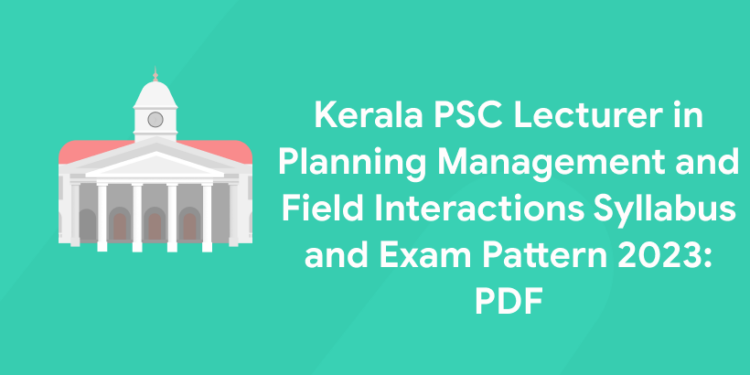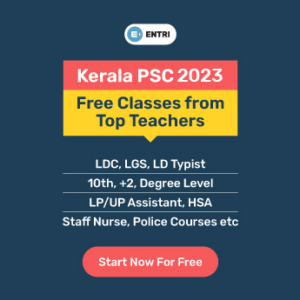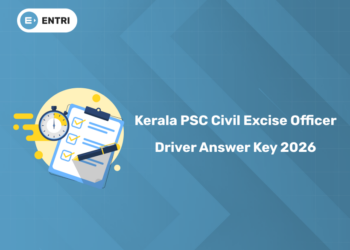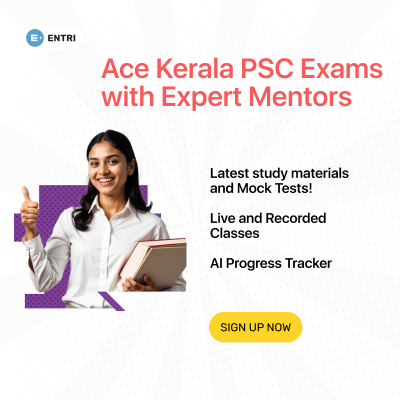Table of Contents
Kerala PSC Lecturer in Planning Management and Field Interactions Syllabus and Exam Pattern 2023: Kerala PSC Lecturer in Planning Management and Field Interactions exam is going to be conducted on October 17, 2023. The candidates who are interested in appearing for the exam can get details about the syllabus and exam pattern here.
Kerala PSC has released the syllabus and exam pattern for Lecturer in Planning Management and Field Interactions exam. The syllabus has been designed keeping in mind the current trends in the recruitment. The syllabus covers topics from English language, General Knowledge, Computer Knowledge, Logical Reasoning and Numerical Ability. Candidates must go through the syllabus thoroughly and prepare accordingly. The syllabus link along with the PDF is provided in this article. Candidates can go through the syllabus and start preparing for the exam accordingly. The Kerala PSC Lecturer in Planning Management and Field Interactions exam is an important recruitment exam that will select suitable candidates for the post. The syllabus and exam pattern will help candidates prepare for the exam and ace it. All the best!
Download Entri app and start preparing for KPSC Exams!!!
Kerala PSC Matron Grade 1 Exam Pattern and Syllabus 2023: Highlights
| Particulars | Details |
| Name of recruiting organization | Kerala Public Service Commission (PSC) |
| Name of department | Kerala General Education |
| Name of post | Lecturer in Planning Management and Field Interactions |
| Category number | 378/2022, 379/2022 |
| Recruited for | Statewide |
| Number of vacancies | As per Notification |
| Type of Exam | OMR |
| Number of Questions | 100 |
| Total Marks | 100 |
| Medium of Questions | Malayalam/ Kannada/ Tamil |
| Mode of application | Online |
| Mode of recruitment | Direct Recruitment |
| Exam Duration | 2 Hours |
| Official Website | www.keralapsc.gov.in |
Kerala PSC Lecturer in Planning Management and Field Interactions Syllabus 2023: Release Date
1: The first recipient of the ‘Rajiv Gandhi Khel Ratna’ award?
The official syllabus for the Lecturer in Planning Management and Field Interactions Exam 2023 was declared public by the Kerala Public Service Commission (KPSC) on September 2023. To properly prepare for the exam, candidates must adhere to the syllabus. English, Malayalam, general knowledge, mental ability, elementary mathematics, etc. are all covered in the curriculum. It is available in both Malayalam and English. It is conveniently available for download in PDF format on the KPSC’s official website. Additionally, a direct link to the website’s syllabus is provided here. The candidate will benefit from the syllabus in understanding the content and format of the test. To comprehend and efficiently prepare for the Lecturer in Planning Management and Field Interactions Exam 2023, candidates should read the syllabus. Find out more below!
Enroll in Kerala's Top-rated HSA Coaching Program!
സർക്കാർ ജോലി എന്ന സ്വപ്നം ഇനി സ്വപ്നം മാത്രമല്ല! Join Entri's HSA Coaching Program
Join Now!Kerala PSC Lecturer in Planning Management and Field Interactions Recruitment 2023: Exam Date
Kerala Public Service Commission (KPSC) has officially announced the Lecturer in Planning Management exam date for 2023. The exam will take place on October 17, 2023. The exam’s hall ticket or admit card is accessible at keralapsc.gov.in. Candidates can download their hall passes by logging into the official website.
Candidates must enter their application number, date of birth, or any information they supplied when registering in order to download the admit card for the Lecturer in Planning Management Exam. You must have your admission card in order to take the exam. It includes details such as exam location, timings, etc. Candidates should double-check the information on their admission cards and get in touch with the exam organizers if there are any inconsistencies. To the testing location, candidates should also bring a copy of their hall ticket and a valid photo ID.
It is advisable that the applicants arrive at the testing location an hour before the exam starts. All applicants are urged to regularly check the official website for updates on all details pertaining to the exam and its admit card.
Kerala PSC Lecturer in Planning Management and Field Interactions Admit Card 2023
The Kerala PSC Lecturer in Planning Management and Field Interactions Hall Ticket 2023 has been released. The admit card for the Lecturer in Planning Management and Field Interactions exam is available to download on the Kerala PSC official website from September 30, 2023 onwards. The exam’s applicants can now download their admission cards and review the exam information. The admission card is required to take the exam. No candidates will be admitted to the exam room without it. Important details including the candidate’s name, the exam’s date, time, and location are all included on the admit card. Before taking the exam, candidates must thoroughly review all the details.
Candidates must go to the Kerala PSC website and enter their login information in order to download the Lecturer in Planning Management and Field Interactions Hall Ticket 2023. After logging in, users can view and print their admit card. The admit card is the sole document that will allow a candidate entry into the exam room, thus they must have it with them on the day of the exam. We hope that all of the aspirant candidates will succeed on the test and wish them luck.
Click on the below link to download Kerala PSC Lecturer in Planning Management and Field Interactions Admit Card 2023 for the category number 378/2022 and 379/2022.
Kerala PSC Lecturer in Planning Management and Field Interactions Recruitment 2023: Important Dates
| Event | Dates |
| Kerala PSC Lecturer in Planning Management and Field Interactions Admit Card 2023 | September 30, 2023 |
| Kerala PSC Lecturer in Planning Management and Field Interactions Exam Date 2023 | October 17, 2023 |
| Kerala PSC Lecturer in Planning Management and Field Interactions Shortlist 2023 | Notify Later |
| Kerala PSC Lecturer in Planning Management and Field Interactions Rank List 2023 | Notify Later |
| Kerala PSC Lecturer in Planning Management and Field Interactions Answer Key 2023 | Notify Later |
Enroll in Kerala's Top-rated HSA Coaching Program!
സർക്കാർ ജോലി എന്ന സ്വപ്നം ഇനി സ്വപ്നം മാത്രമല്ല! Join Entri's HSA Coaching Program
Join Now!Kerala PSC Lecturer in Planning Management and Field Interactions Syllabus 2023: Download PDF
The syllabus and exam format for the Lecturer in Planning Management and Field Interactions exam have been issued by Kerala PSC. Candidates who are considering taking the exam can learn more about the syllabus and exam format here. The latest trends in hiring have been taken into consideration when creating the syllabus. English language, general knowledge, computer knowledge, logical reasoning, and numerical ability themes are all covered in the curriculum. Candidates must carefully review the syllabus and make the necessary preparations.
Find the Kerala PSC Lecturer in Planning Management and Field Interactions Syllabus 2023 PDF for the category number 378/2022 below.
Find the Kerala PSC Lecturer in Planning Management and Field Interactions Syllabus 2023 PDF for the category number 379/2022 below.
Kerala PSC Lecturer in Planning Management and Field Interactions Exam Pattern 2023
- Total Number of Questions: 100
- Total Marks- 100
- Each question carries 1 marks
- Duration of examination – 2 Hours
| Topic | No. of Questions | Total Marks | Time Duration |
| General Subject (Part One) | 50 | 50 | 2 Hours |
| General Subject (Part Two) | 50 | 50 | |
| Total | 100 | 100 |
Kerala PSC Lecturer in Planning Management and Field Interactions Syllabus 2023: Detailed
Unit 1: Community Resources
- Resources that enhance or facilitate the lives of people in a community – examples of community resources are factories, educational institutions, cinema halls, libraries, religious places, hospitals, community centers, parks, etc – make use of these resources in education as it develops a sense of value and belonging among students.
Unit 2: Community Engagement
- Community Engagement in Education – and symbiotic relationship that exists between communities and Education Institutions – sustainable networks, partnerships, communication media, and activities – Linking formal learning and the local community
Unit 3: Forms of community engagement
- Community-student engagement -Researching with the community, sharing knowledge with the community, Designing new curriculum and courses, Involving local practitioners as trainers, Social Innovation by students and the like
Unit 4: Practices for Community engagement
- Engagement practices and activities – formal or informal – include building relationships through collaboration initiatives, community campaigns, Community Survey, Community services, Excursions, cooperatives, small businesses, consultation meetings & conferences, sports events, cultural events, community development and community research projects.
Unit 5: Rural Community Development
- Social, economic, political and cultural framework of the rural society – Rural Resilience – Rural Institutions Close to Community, Participatory Learning – Approaches and Methods, Community Project Proposals and Project Management, Community living camps, Engagement with – School, Street Committee, Health Centre, Panchayat, SHGs – Programmes
Module II : Syllabus for General Subject – ICT in Education Total: 10 Marks
Unit 1: Potentials of ICT in Education
- ICT as a means to connect with the world – Pedagogy and ICT – Potentials and Advantages of Approaches to ICT
- Unit 2: ICT integration in Curriculum transaction
Computer based Curricular planning- ICT Based Model of Curriculum Transaction – Considerations for integrating ICT – Innovations in Curriculum Transaction
Unit 3: ICT and Internet Resources for Teaching and Learning
- Resources – Access and Creation, resource mobilization – Web-based learning, Social Networking –Virtual learning Environment – Designing e-initiatives
Unit 4: ICT in Classrooms
- Creating Personal learning environments – ICT integrated Inclusive education – Assistive and Adaptive technologies
Unit 5: ICT for Assessment and Evaluation
- Purposes and Techniques of Evaluation, Scope of ICT for evaluation- Innovative Practices in Assessment & Evaluation
Module 3 : PERSPECTIVES OF EDUCATION (10 Marks)
PHILOSOPHICAL PSYCHOLOGICAL AND SOCIOLOGICAL PERSPECTIVES OF
EDUCATION
Philosophical perspectives of Education
- Role of education in philosophizing the issues of life –Metaphysics, Epistemology, Logic, Phenomenology, Aesthetics and Axiology. Critical appraisal of schools of philosophy in the context of Twenty First Century – aims, content, methods an ongoing changes. Focus of education in the 21st century. Building perspectives on educational philosophies. Modern schools of Philosophy-Empiricism, Positivism, Relativism.- Post -structuralist views and eclectic views. Comparative study of philosophies and educational contributions of Indian and western thinkers
Psychological perspectives of education Learning and development
- Learner Characteristics and Learning styles with special reference to pre- primary, primary, secondary, higher secondary and adult learners Learning in twenty first century classrooms., Characteristics And types, Development – language development, emotional, moral, motor and identity development. Cognitive Functions Thinking, Reasoning, Problem Solving and Meta-cognition, Personality- types characteristics and development Intelligence-different types~ Multiple, Cultural, social and emotional, impact on learners. Mental Health-, Factors affecting Mental Health (parents, family environment, society, school practices) – Strategies for enhancing Mental health
Sociological perspectives of education
- Education for social security, wellness and progress, sustenance and transformation in society. Determinants of social change in the context of globalization.-Constraints on social change in India with respect to caste, ethnicity, class, language, religion, gender, regionalism, political interest
- Education and Secularism – Role of teacher in inculcating democracy and international values.- Pluralism – Role of education in creating unity in diversity- Nationalism and education.-Role of Education in addressing cultural lag, privatization, globalization and partnership in social progress – Current trends in social development and transformation of values in society.
Module 4 : Teaching aptitude (10 Marks)
Teaching aptitude.
- Teaching -characteristics, levels, phases and maxims
- Teaching methods, techniques and strategies
- Modern trends in professional development and ethics
- Technology integration in education
- Research, evaluation and innovations in classroom teaching, –
Module 5 : Research Aptitude (10 Marks)
- Research Meaning, Characteristics and Types
- Steps to Research
- Methods of Research
- Aims of Educational Research
- Research Ethics
- Research paper, Article, Workshop, Seminar, Conference and Symposium
- Thesis writings – its characteristics and Format
PART II (50 Marks)
Primary Education (10 marks)
- Nipun Bharat Mission-Foundational Literacy and Numeracy Survey (FLS) 2022-
National Achievement Survey (NAS) 2021-ASER 2022- Post NAS/FLS Planning,
Management and Administration in Primary Education - Right to Education Act (RTE) 2009 -Duties of Local Self Government Institutions-parents ‘duties and parental engagementResponsibilities of Schools and Teachers and their Management-Primary Education Curriculum and Assessment–Suggestions for models/par diagram- Critical analysis on Management and Implementation of RTE 2009
- Phenomenal Learning–Transversal thinking-social constructivism–Discussion on Appropriate Pedagogical approaches for Kerala
Planning and Management (15 marks)
- Budgeting in Education concept-Types–Process-Conventional and Innovative
Budgeting - Cost Benefit Analysis in Education
- Total Quality Management (TQM) in Education
- Knowledge Economy–origin –scope-impact-Knowledge Management Process, Models
- ICT in Education–Management Information System in Education Command and Control Centre
- Planning and Management of health education in schools Hypo kinetic diseases and management–Obesity, diabetics, hypertension, Ostroprorsis, coronary heart diseases, back pain.
- Leadership in Educational Planning, Management and Administration
Continuing Education and Distance Education (10 marks)
- Continuing Education Vs Lifelong Learning–India in the context of international trends –Lifelong Learning par diagram in Kerala
- New Education Policy 2020 and continuing Education-Relevance of SCOLE KeralaPlanning, Management and Administration of continuing Education in Kerala
- Emerging Distance Education models –Continuing Education, Lifelong Learning and Distance Education- comparative perspective in Kerala Scenario.
Education Extension, Guidance and Counselling Teacher Education (15 marks)
- Extension as the Third Dimension- Appraisal of ongoing extension programmes in Education. Measurable goals in Education Extension/How can Education Extension be made measurable, visible and accountable? Extension in the General Education scenario of Kerala-Develop tangible models
- Educational Guidance beyond frontiers – Role of teachers and schools Management and Administration of educational guidance in the emerging global career and educational perspective
- Role of counselling in developing and nurturing mental health of children. Group counselling Vs personal counselling–Telephone Counselling Vs e counselling–Develop an appropriate counselling plan for girls
- Teacher Education as a tool for teachers’ empowerment and teacher transformation. Critical appraisal of teacher education in Kerala. Elucidate the gap between teacher education and classroom teaching, if any
How to Download Kerala PSC Lecturer in Planning Management and Field Interactions Syllabus?
Follow the below steps to download Lecturer in Planning Management and Field Interactions Syllabus
- Visit official website at https://www.keralapsc.gov.in
- Click on “Download” Tab
- Choose syllabus from the dropped menu
- Download Kerala PSC Lecturer in Planning Management and Field Interactions Syllabus
- Download and Take a print out for further reference














